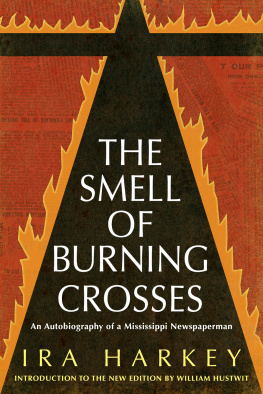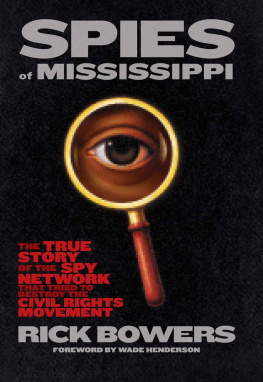
THE SMELL OF BURNING CROSSES
Trent Brown
GENERAL EDITOR
THE SMELL OF BURNING CROSSES
An Autobiography of a Mississippi Newspaperman
IRA HARKEY
INTRODUCTION TO THE NEW EDITION BY WILLIAM P. HUSTWIT
University Press of Mississippi Jackson
The University Press of Mississippi is the scholarly publishing agency of the Mississippi Institutions of Higher Learning: Alcorn State University, Delta State University, Jackson State University, Mississippi State University, Mississippi University for Women, Mississippi Valley State University, University of Mississippi, and University of Southern Mississippi.
www.upress.state.ms.us
The University Press of Mississippi is a member of the Association of University Presses.
Copyright 1967, 1995, 2006 by Ira B. Harkey Jr.
Introduction to the New Edition 2019 by William P. Hustwit
All rights reserved
Manufactured in the United States of America
UPM first printing 2019
Publishing history: First Printing April 1967; Second Printing July 1967;
Third Printing September 1967; Fourth Printing 2005
Library of Congress Cataloging-in-Publication Data available:
LCCN | 2019030037 |
Hardback ISBN | 978-1-4968-2484-4 |
Trade paperback ISBN | 978-1-4968-2485-1 |
Epub single | ISBN 978-1-4968-2486-8 |
Epub institutional | ISBN 978-1-4968-2487-5 |
PDF single | ISBN 978-1-4968-2488-2 |
PDF institutional | ISBN 978-1-4968-2489-9 |
British Library Cataloging-in-Publication Data available
CONTENTS
William P. Hustwit
For Marion Marks Harkey
INTRODUCTION TO THE NEW EDITION
William P. Hustwit
THE NAME IRA BROWN HARKEY JR., SELDOM APPEARS IN CIVIL RIGHTS books. Hes been forgotten altogether by the historians or else relegated to the back notes, lamented author Paul Hendrickson, and perhaps one reason for this is that he left the state early, before the war was won. Although lesser-known, Ira Harkeys autobiography, The Smell of Burning Crosses, should be remembered as an unflinching book about a gutsy Mississippi integrationist and newspaperman.
Ira Harkey shared the more progressive racial views of Mississippi editors like Hazel Brannon Smith of Lexington and Hodding Carter, whom Harkey celebrated as the old Greenville warhorse, but not precisely their perspective.
Just after the great civil rights upheaval of the mid-1960s, Harkey wrote a taut, timely, and unrelentingly critical book about his harrowing experiences in Pascagoula. The work resembles a series of vignettes drawn from his editorial archive rather than a history or a narrative. Harkey also inserts news articles from across Mississippi to underscore the ubiquitous and naked racism in daily reporting. Throughout his autobiography, Harkeys humor is biting and sarcastic; his tone is combative. Fight back without delay, Harkey advises other liberal southern editors. In
Literary critic William Dean Howells once labelled autobiography the most democratic province in the republic of letters. He knew this because anyone and everyone from presidents and generals to ex-slave and convicts can write his or her own story. Little wonder then that Ira Harkey Jr. wrote autobiographically as a final, heterodox jab at Mississippis inbred inequality and racism.
Howells could have easily added journalists and outcasts to his list of autobiographers. Ira Harkey played the role of a pariah on a mission to help a state full of pariah people. Nobody would be seen talking to me around Pascagoula, he sighed in an interview. [A]ll the people I thought were with me had evaporated at the time that I needed them. Many icons of Mississippis civil rights era were, by inclination or by trade, writers and isolatesJames Meredith, Hazel Brannon Smith, and Anne Moody, to name a fewmen and women who either chose an occupation or a cause that carried with it the condition of apartness.
Few probably felt lonelier than Ira Harkey, who washed ashore like a castaway on the Gulf Coast. In 1963, when Harkey eventually fled Mississippi, he explained that he could not function in a silence of total isolation as if I were underwater or in galactic space. I was a pariah. His pariah status marked him as an outsider from start to finish. He later changed the subtitle of his autobiography from A Mississippi Newspaperman to A White Integrationist Editor in Mississippi to put even more distance between himself and the place he once called home. The latter title better reflected Harkeys solitary and adversarial existence in the Magnolia State.
In 1949, Harkey came to Pascagoula as a wide-eyed and idealistic thirty-one-year-old. Born in 1918, he grew up affluent and privileged in the Garden District of New Orleans.
Early influences and ideas shaped Harkeys racial beliefs. In the Harkey household, his mother, Flora, never allowed him to use the epithet nigger. Christian ladies and gentlemen dont say that word, she repeated to him. When he backslid, she threatened to wash his mouth out with soap. One suspects his mothers antiseptic scolding carried over into her sons colorless journalistic policies. As editor, Harkey later refused to identify people by race in the Chronicle, except when relevant to a story. In Sunday school, Harkey absorbed more lessons about Christian brotherhood and Gods love for all people, regardless of skin color. He also noted other, secular contributors. A student of history, Harkey liked to read biographies about great Americans and got some idea of the concept of what democracy and Americanism is. And this made no mention of appearance. In college, he befriended students and faculty from outside the South and soaked up non-provincial outlooks. Talking with them for three or four years changed my mind and Southern attitude. Harkeys real racial epiphany, however, occurred during World War II.
One day in 1945, aboard the Hancock, a bomb accidentally exploded on deck and killed fifty-two crewmenblack and white. There was blood everywhere, ankle deep it seemed, Harkey recounts in Crosses. I looked in astonishment at the blood, the thick bright red beautiful blood that oozed like a tide over the flight deck, eddying around the parcels of humans that lay on it, ebbing and flowing with the rhythm of the sea. Observing the burial at sea, Harkey watched the blur of canvas sacks slip over the side and the conviction came to me that the Negro, who is good enough to be gutted by an unsegregated explosion, to be trussed in an unsegregated sack, to be dumped in an unsegregated ocean and dispatched to an unsegregated heaven or hell, is just exactly good enough to live in an unsegregated life in the nation of his birth.
Four years later, Harkey put his racial egalitarianism into practice after buying the Chronicle. The new owner-editor immediately challenged some the newspapers prevailing policies regarding race. The Chronicle dropped the segregated Jim Crow section, covered more news about the black community, and discarded Negro and Colored tags in almost all articles. Harkey also insisted on courtesy titles for prominent black women. The changes went unnoticed by the public until the paper ran a story about an abusive father who beat his stepson. Letters of sympathy for the mother and child poured in until the Associated Press released a photograph of the boy, who turned out to be black. One disgruntled white reader complained, If
Next page





